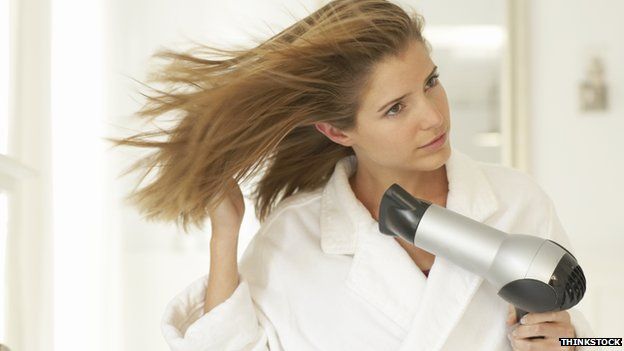Who, what, why: Does limiting the power of appliances save energy?
- Published

The European Commission has banned the sale of powerful vacuum cleaners. Now it might do the same for other domestic appliances, but would this actually cut energy consumption?
It started with vacuum cleaners. Then there were howls of outrage when it emerged the European Commission has set up a working group to look at whether other common household appliances - kettles, toasters, bread makers and hairdryers among them - should also be regulated.
The working group is at an early stage and may rule out many of the products. But is the premise correct - does the power of an appliance determine energy consumption? Or by halving the wattage do you simply mean that someone uses it for twice as long?
Take hairdryers. You could use a 1,000-watt hairdryer for a minute or a 500-watt one for two minutes and it would in theory use the same energy. But, says Henry Lau, outreach officer at the Institute of Physics, it's not that simple. You have to look at how efficient hairdryers actually are. "Part of the power is being used to power a heating element, you'll get some energy wasted heating other parts of the hairdryer, not just the air." Design matters - is it better to have faster-blown air, or hotter air?
For vacuum cleaners, better nozzle and filter design means that you can suck up more dust without increasing the power of the motor, says Chrissy McManus, technical manager at the Association of Manufacturers of Domestic Appliances. Which? Magazine has made the same point, while noting many of its Best Buys have motor sizes that exceed the new limit of 1,600 watts.
There's no simple relationship between motor power and energy use, says Prof Will Stewart, fellow at the Institute of Engineering and Technology. And a big motor used at low power will use about the same energy as a smaller one doing the same job. But the EU is right to expect better efficiency. He estimates it should take about 2,000 watts of power applied for less than a minute to dry wet hair. Yet most hairdryers take far longer with similar or more powerful motors. The hope must be that manufacturers will do more with less power. But he wonders if regulation is necessary. "The hairdryer is a very small potato in terms of energy use."
Subscribe to the BBC News Magazine's email newsletter to get articles sent to your inbox.